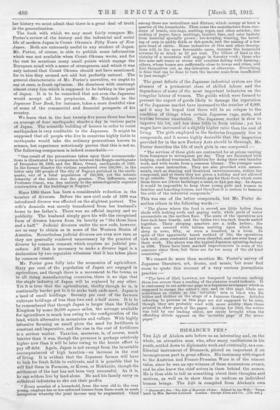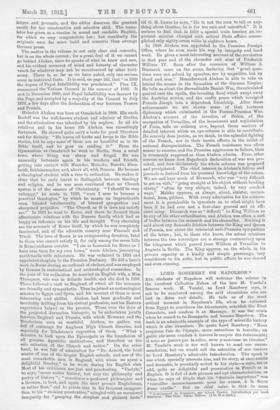BISMARCK'S PEN.*
THE Life of Abeken sets before us an interesting and, on the whole, an attractive man who, after many vacillations in his youth, settled down to diplomatic work and eventually, as a con- fidential instrument of Bismarck, played an important if an inconspicuous part in great affairs. His testimony with regard to the Austrian and Franco-Prussian Wars is of the utmost value, since be was an eye-witness of these momentous events, and he also knew the chief actors in them behind the scenes. He is thus able to tell us something about their thoughts and motives, as well as to show them in undress as individual human beings. The Life is compiled from .A.beken's own • • Bienteorck's Pen r•The life of Heinxich Abele'''. Edited by his Wife.- Trans- lated by Mrs. Barrett-Lenunrd. London : George Allen and Co. [Us. net.] letters and journals, and the editor deserves the greatest credit for her constructive and selective skill. The trans- lator has given us a version in sound and readable English, for which we may congratulate her; but manifestly the originals were far more lucid and concrete than average German prose. The mutter in the volume is not only clear and concrete, but is on the whole correct; for a great deal of it we cannot go behind Abeken, since he speaks of what he knew and saw, and his evident accuracy of mind and honesty of character vouch for whatever may not be corroborated by other testi- mony. There is, so far as we have noted, only one serious error in historical facts. It is said, on page 241, that " in 1869 the dogma of Papal Infallibility was proclaimed." Pius IX. summoned the Vatican Council in the summer of 1868. It met in December 1869, and Papal Infallibility was decreed by the Pope and accepted by a majority of the Council in July 1870, a few days after the declaration of war between France and Prussia.
Heinrich Abeken was born at Osnabruck in 1809. His uncle Rudolf was the well-known student and admirer of Goethe, and the admiration was inherited by his nephew. In all his relatives and in his home life Abeken was exceedingly fortunate. Ho showed quite early a taste for good literature and for divinity. "He leaves all books and keeps to the Bible stories, but he says none of them are so beautiful as in the Bible itself, and he goes on reading it." From the Gymnasium at Osnabriick be went to Berlin, then a small town, where living was cheap and frugal. He was unusually fortunate again in his teachers and friends, getting into contact with Neander, Meineke, Boeckb, Hum- boldt, Schleiermacher, and, above all, with Bunsen. He became a theological student with a view to ordination. He makes it clear that he early learnt to distinguish between theology and religion, and he was soon convinced that no Church system is of the essence of Christianity. "I should be very unhappy," he wrote in 1830, "were I ever to become a practical theologian," by which he means an impracticable man, blinded intellectually, of blunted sympathies and sharpened prejudice. "The Church as it is does not satisfy me." In 1831 he went to Rome, and there he formed those affectionate relations with the Bunsen family which had so happy an influence on his life and thought. Very charming are his accounts of Rome itself, by which be was completely fascinated, and of the adorable country near Frascati and Tivoli. The love of Rome is an overpowering devotion, fatal to those who cannot satisfy it, for only among the seven hills is Rome-sickness curable. "I am as homesick for Rome as I have ever been for my own home," wrote Abeken, journeying northwards with reluctance. He was ordained in 1834 and appointed chaplain to the Prussian Embassy. He did a hero's work in Rome during an outbreak of cholera, and was employed by Bunsen in ecclesiastical and archaeological researches. In the year of his ordination ho married an English wife, a Miss Thompson, who was in delicate health, and she died in 1836.
There followed a visit to England, of which all the accounts are friendly and sympathetic. Then be joined an archaeological mission to Egypt and Syria, and his account of them is most interesting and skilful. Abeken had been gradually and inevitably drifting from his clerical profession, and his Eastern experiences helped on the process. Those were the days of the projected Jerusalem bishopric, to be undertaken jointly between England and Prussia, with which Newman and the Tractarians were so wrathful. Abeken, we gather, was fall of contempt for Anglican High Church theories, and especially for Gladstone's exposition of them. " What a delusion to look upon the Episcopate as the foundation of all genuine Apostolic institutions, and therefore as the sole salvation of the Church and nation." On the other band, he was full of admiration for "Dr. Arnold, the head master of one of the largest English schools, and one of the most remarkable men in England, with whom we spent a delightful Sunday," as he wrote during his English visit. Most of his criticisms are just and penetrating. "Carlyle," be says, "never writes history, but only the philosophy and poetry of history "; "sometimes a profound philosopher and a German, to boot, and again the most prosaic Englishman, or rather Scot," and he points also to his frequent exaggera- tion, to his " sti iking penetration," mingled with an occasional incapacity for " grasping the simplest and plainest facts." Of G. H. Lewes he says, "He is not the man to tell us any- thing about Goethe; he is far too vain and conceited." It is curious to find that in 1850 a special train bearing an im- portant mission charged with critical State affairs accom- plished only eighty-seven miles in eighteen hours.
In 1848 Abeken was appointed to the Prussian Foreign Office, where he soon made his way by integrity and hard work. He gives a most interesting account of the revolution in that year and of the character and aims of Frederick William IV. Soon after the accession of William I. Bismarck came on the scene, declaring that " great ques- tions were not solved by speeches, nor by majorities, but by blood and iron." Henceforward Abeken is able to take us behind the scenes in the formation of the German Empire. He tells us about the discreditable Danish War, the calculated quarrel over the spoils, the invading flood which swept away the Austrian armies, and the crafty peace which inveigled Francis Joseph into a dependent friendship. After these achievements we are shown some of that tortuous diplomacy which culminated in the Franco-Prussian War. Abeken's account of the invasion, of Sedan, of the occupation of Versailles, of the investment and capitulation of Paris, tells us nothing new, beyond those matters of detailed interest which an eye-witness is able to contribute. He scarcely does justice, as we think, to the splendid fighting of the Trench, nor to their heroic efforts in the midst of national disorganization. The French resistance was often nearer to success, and the Prussian aggression to failure, than is commonly supposed or than Abeken admits. From other sources we know how Napoleon's declaration of war was pro- voked, and how deliberately the whole scheme was prepared and precipitated. The chief interest in Abeken's letters and journals is derived from his personal knowledge of the actors. We see and. hear much of Bismarck, who was " very difficult to get on with," "going straight at his object without heeding others," "often by very oblique, indeed, by very crooked ways." Moltke appears, as always, silent, sinister, unemo- tional, keen, pitiless. With every admiration for his achieve- ment it is permissible to speculate as to what might have been if he had ever met a first-class general and an effi- cient army. Bismarck was as " difficult " to King William as to any of his other subordinates, and Abeken was often a sort of buffer between the monarch and his chancellor. Nothing is said about any domestic friction between the King and Queen of Prussia, nor about the vehement anti-Prussian sympathies of the latter ; but, to those who know, the actual relations between the two sovereigns are a strange commentary upon the telegrams which passed from William at Versailles to Augusta in Berlin. The King appears, on the whole, in his private capacity as a kindly and simple personage, very considerate to his suite, but in public affairs he was shrewd and even cunning.







































 Previous page
Previous page